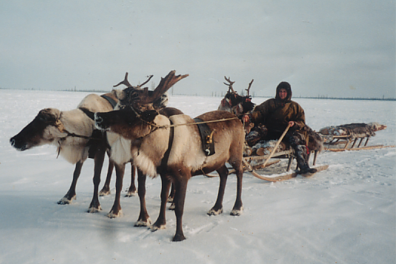Doctoral course on life in the Nenets (Russian Arctic) at the beginning of the 21st century

Argumentary
The Nenets, who number just under 50,000 in the Russian Arctic between the Kola and Taimyr peninsulas according to the latest Russian census, are one of Russia's most vital northern peoples. While many live in conditions that are familiar to us - urban Nenets, civil servants, employees - a large proportion of them, probably around half, either live sedentary lives in villages, or follow their reindeer on long migrations in search of food. They are perfectly adapted to the harsh climatic conditions and ecosystem of the tundra, which does not support agricultural production, but offers reindeer herders immense grazing land. Their thrifty, efficient way of life has endured, even through the Soviet upheavals.
An initial series of two lectures will focus on their daily life on the Yamal Peninsula. Liivo Niglas, who went on the annual migration with a brigade of reindeer herders, filmed them in all kinds of activities. The result is a documentary Une brigade, but also a series of short films illustrating particular dimensions of daily life. These two screenings will reveal some of these aspects: how children enjoy sporting competitions, how we eat the meat of a just-slaughtered reindeer and drink its blood, how we fetch firewood, how we communicate by radio with the center of the reindeer sovkhoze, how we move from one point to another, how we take care of newborn reindeer calves. The films will have French subtitles.
The second series of two lectures will be given by Laur Vallikivi, anthropologist of religions, who spent a year with two groups of reindeer herders in the European part of the Russian Arctic. He will present the groups he studied, which have the characteristic of having escaped Sovietization. In a first lecture, he will show how this was possible, and what the constraints of their living conditions were. In a second lecture, he will focus on religious practice, describing the traditional Nenetse religion they practiced during the Soviet period, and showing how Baptist missionaries succeeded in converting a significant proportion of these groups. These lectures will be illustrated by abundant photographic material.
The lectures, depending on the audience, will be either in English or Estonian with consecutive interpretation.
Program
Monday May 5, 2025, 10am-12pm at Inalco - Pôle des Langues et Civilisation - Salle 4.05 (65, rue des Grands Moulins, Paris 13e)
- Liivo Niglas: La vie quotidienne des Nénetses du Yamal au début du XXIe siècle : une migration, les rennes nouveau-nés
Wednesday, May 7, 10am-12pm at Inalco - Pôle des Langues et Civilisation - Salle 3.11 (65, rue des Grands Moulins, Paris 13e)
- Liivo Niglas :The daily life of the Yamal Nenets at the beginning of the XXIe century: a ritual feast, the quest for firewood, sporting activities, radio contacts
Monday, May 12, 2025, 10am-12pm at Inalco - Pôle des Langues et Civilisation - Salle 4.05 (65, rue des Grands Moulins, Paris 13e)
- Laur Vallikivi: A year in the field among non-Sovietized Nenets: the Nenets of Yamb-to and the Polar Urals. How they managed to live while escaping the totalitarian state?
Wednesday, May 14 10am-12pm at Inalco - Pôle des Langues et Civilisation - Salle 3.11 (65, rue des Grands Moulins, Paris 13e)
- Laur Vallikivi : The Nenets of Yamb-to and the Polar Urals: their religious practices before conversion to baptism and after
Organization
- Éva Toulouze (CREE, Inalco)